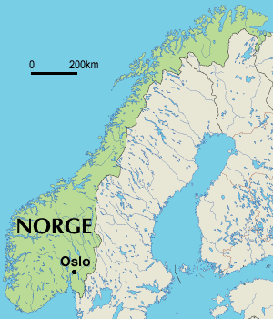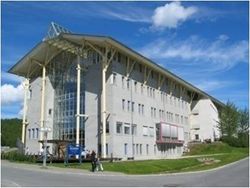Marine Biotechnology in Norway
Go back to: Home > Strategies, Policies and Programmes > European countries
| UPDATED August 2016 |
Overarching science strategies, plans and policies
- National Whitepaper: “Climate for research” describes the overall Norwegian government’s research strategy.[1]
- National Whitepaper: “Marine Bioprospecting- a source of new and sustainable wealth growth” describes the Norwegian government’s strategy for marine bioprospecting.[2]
- National Whitepaper: “National strategy for biotechnology” describes the Norwegian government’s strategy on biotechnology.[3]
- National White paper: “Strategy for an Environmentally Sustainable Norwegian Aquaculture Industry” describes the Norwegian government’s strategy on aquaculture.[4]
- National White paper: “Nordområdestrategien” describes the Norwegian government’s strategy for research in the high north.[5]
- National Whitepaper: "Long-term plan for research and higher education 2015–2024" describes the government's focus for 10 years.[6]
Research funding schemes and programmes
The Research Council of Norway (RCN) funds research projects, innovation projects, industrial projects and infrastructure. Relevant research programmes includes:
- BIOTEK2021: A research financing program that finance applied academic research and industrial development of biotechnology.[7]
- Aquaculture- An industry in growth: A research financing program that finance applied academic research and industrial development on aquaculture and fisheries.[8]
- The ocean and the coast: A research financing program that finance academic research and industrial development on eco systems and the marine environment.[9]
- Sustainable Innovation in Food and Bio-based Industries: A research financing program that finance applied academic research and industrial development of bio-based industries.[10]
- Polar research: A research financing program that finance research on sustainable management and development of industries in the high north.[11]
- Pre-industrial support: A funding program focused on technology transfer from academia to industry.[12]
- Industrial support: A funding program supporting industrial developments.[13]
Innovation Norway funds innovation projects with industry and infrastructure. Relevant programmes include:
- Public R&D contracts and Private R&D contracts, where SMBs can be funded with up to 35% in a collaboration project with either a public or private customer.[14]
- Entrepreneurial grant, where start-ups can be funded in an initial period of the company.[15]
SIVA funds infrastructures, such as laboratories and necessary housing for innovation centres.[16]
Regional research foundations funds research projects, innovation projects, industrial projects and infrastructure.[17]
A collaboration effort exists between Innovation Norway, The research council of Norway, SIVA and equivalent research councils in the United Kingdom to fund innovation and applied research in marine biotechnology.[18]
Research priorities for marine biotechnology research
- Bioprospecting / Biodiscovery, Aquaculture, Human and animal health
- Fisheries
- Polar research
- Industrial biotechnology
- Bio-based industries
Strategic documents
- Strategy plan for Marine Bioprospecting: A strategy document formed by the RCN, Innovation Norway and SIVA on how to implement the national strategy for Marin Bioprospecting.[19]
- The Arctic and Northern Areas Initiative (Forskning.nord.to): The Research Council of Norway’s research strategy for the high north.[20]
- HAV21: The marine strategy for Norway. [21]
Infrastructures and coordination and support capacities / initiatives
- In 2012, Norway operates 9 local/coastal vessels from 12,2m to 31,25 m; 1 regional vessels of 47,24m (Hakon Mosby); 4 oceanic from 56,80m to 64,40; and 3 global vessels from 66,65m to 102,8m registered at the European Research Vessels InfoBase.[22]
- In 2012, Norway maintains about 11 large marine research equipments registered in the European large Exchangeable instruments database. [23]
- Key aquaculture experimental and research facilities in Norway include:
- Breeding facilities (Aqua Gen AS)
- Skretting, Marine Harvest (Center for Aquaculture Competence AS)
- Trial farms (Ewos Innovation AS)
- Comercial sea based facilities (Fjord Forsøksstasjon Helgeland AS )
- Grow out sea based facilities( GIFAS - Gildeskål Forskningsstasjon )
- Cod Breeding Centre Nofima Marin
- Grow out sea based facilities (NIVA)
- SEALAB (SINTEF)
- Aquaculture research station (Havbruksstasjonen)
- Grow out unit (Val Akva)
- Grow out sea based facilities (VESO Vikan Akvavet)
- Cod Farm and Miljølaks (Villa AS)
- IMR - Flødevigen Research Station (Institute of Marine Research )
- IMR - Matre Research Station (Institute of Marine Research)
- CodTech laboratory (NTNU)
- IMR - Austevoll Research Station (Institute of Marine Research)
- Biotech North: BioTech North is the network organisation for the development of biotechnology in the Tromsø region in North Norway.[24]
- 10 biotechnology platforms: These technology platforms have been built up during the course of the FUGE programme. They offer service in different high tech niches to academic researchers and industry.[25]
- MarBank: A national marine biobank organising the collection, and structuring of the marine biodiversity for research and industrial development.[26][27]
Major initiatives
- The two major initiatives within marine sciences are the Aquaculture program and the BIOTEK2021 program mentioned above.
References
- ↑ http://www.regjeringen.no/pages/2178785/PDFS/STM200820090030000DDDPDFS.pdf
- ↑ http://www.regjeringen.no/upload/FKD/Vedlegg/Diverse/2009/Marin_bioprospektering_080909_lavoppl.pdf
- ↑ http://www.regjeringen.no/upload/KD/Vedlegg/Forskning/Bioteknologistrategi.pdf
- ↑ http://www.regjeringen.no/upload/FKD/Vedlegg/Diverse/2009/strategy%20for%20an%20sustainable%20aquaculture.pdf
- ↑ http://www.regjeringen.no/upload/FKD/Vedlegg/Diverse/2009/strategy%20for%20an%20sustainable%20aquaculture.pdf
- ↑ https://www.regjeringen.no/en/dokumenter/meld.-st.-7-2014-2015/id2005541/?docId=STM201420150007000ENGEPIS&ch=1&q=
- ↑ http://www.forskningsradet.no/servlet/Satellite?c=Page&pagename=biotek2021%2FHovedsidemal&cid=1253970728155&langvariant=en
- ↑ http://www.forskningsradet.no/servlet/Satellite?c=Page&pagename=havbruk%2FHovedsidemal&cid=1226994216892
- ↑ http://www.forskningsradet.no/servlet/Satellite?c=Page&cid=1226994156395&pagename=havkyst%2FHovedsidemal
- ↑ http://www.forskningsradet.no/servlet/Satellite?c=Page&pagename=bionaer%2FHovedsidemal&cid=1253971968584&langvariant=en
- ↑ http://www.forskningsradet.no/servlet/Satellite?c=Page&pagename=polarforskning%2FHovedsidemal&cid=1231229969369&langvariant=en
- ↑ http://www.forskningsradet.no/prognett-bia/Home_page/1226993636038
- ↑ http://www.forskningsradet.no/prognett-bia/Home_page/1226993636038
- ↑ http://www.innovasjonnorge.no/Finansiering/IFUOFU/
- ↑ http://www.innovasjonnorge.no/Finansiering/Etablerertilskudd1/
- ↑ http://www.siva.no/internett/cms.nsf/pages/english?open
- ↑ http://www.regionaleforskningsfond.no/servlet/Satellite?c=Page&pagename=rff-hovedside/Hovedsidemal&cid=1253954088866
- ↑ https://connect.innovateuk.org/web/biosciencesktn/articles/-/blogs/6374683;jsessionid=E2F58BACA08C2F4ECA1F541C658C55B7.MekushUdbew4
- ↑ http://www.forskningsradet.no/servlet/Satellite?c=Page&cid=1253953666626&pagename=fuge%2FHovedsidemal
- ↑ http://www.forskningsradet.no/servlet/Satellite?c=Nyhet&cid=1253968952749&lang=no&pagename=nord%2FHovedsidemal
- ↑ http://www.hav21.no/servlet/Satellite?blobcol=urldata&blobheader=application%2Fpdf&blobheadername1=Content-Disposition%3A&blobheadervalue1=+attachment%3B+filename%3D%22HAV21ENGWEB100dpi.pdf%22&blobkey=id&blobtable=MungoBlobs&blobwhere=1274502425446&ssbinary=true
- ↑ http://www.eurocean.org
- ↑ http://www.eurocean.org
- ↑ http://biotechnorth.no/
- ↑ http://www.forskningsradet.no/servlet/Satellite?c=Page&cid=1226993591957&pagename=fuge%2FHovedsidemal
- ↑ http://www.imr.no/barentshavet/tokt/toktdagbok_2006/dagbok/marbank
- ↑ http://www.noruega.org.pt/PageFiles/575028/7%20Kjersti%20L%20Gabrielsen_Marbank%20-%20A%20national%20collection%20of%20Arctic%20Marine%20Organisms.pdf
Disclaimer
This country profile is based on available online information sources and contributions from various country experts and stakeholders. It does not claim to be complete or final, but should be considered as a dynamic and living information resource that will be elaborated, updated and improved as more information becomes available, including further inputs from experts and stakeholders. The information on this page is based on information initially compiled by the CSA MarineBiotech Project (2011-2013) and updated by the Marine Biotechnology ERA-NET (2013-2017).

